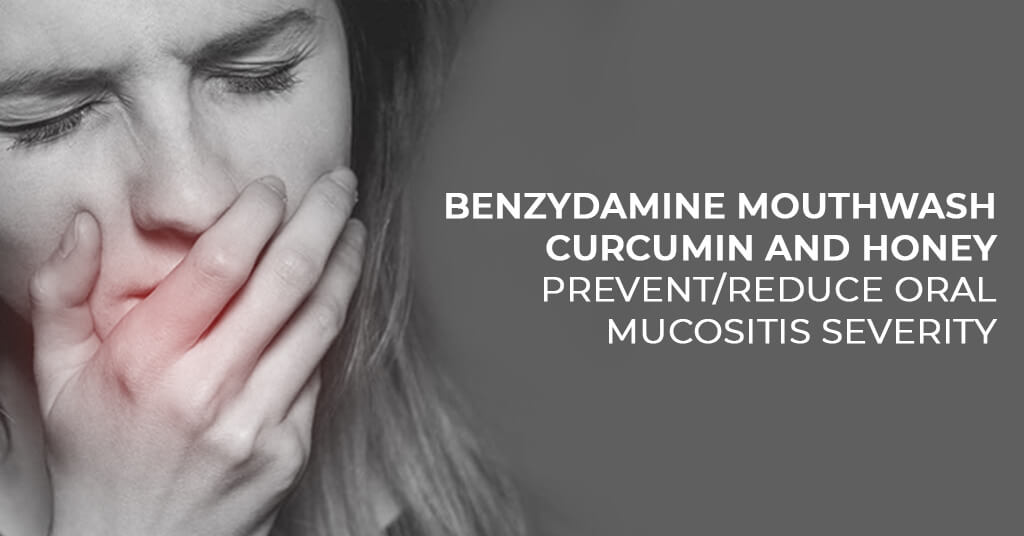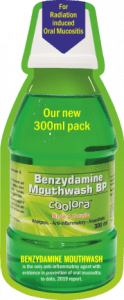Menu

What is Mucositis?
Mucositis applies to the consequences secondary to cancer therapy – chemotherapy and/ or radiation therapy; specifically, the mucosal damage occurring in the oral cavity; pharyngeal, laryngeal, oesophagal regions; and other gastrointestinal tract areas. It occurs in about 20% to 40% of patients undergoing conventional chemotherapy and almost all patients who receive head and neck radiation therapy (H&NRT).
What is OM?
OM is a severely disabling and commonly seen early chemotherapy and radiotherapy effect. OM can trigger an inability to tolerate food or fluids, which leads to malnutrition, dehydration, and weight loss.
How do we classify OM based on severity?
Depending on the severity, OM is grouped as
What are the consequences of intolerable mucositis?
Intolerable OM (grade 3 or higher) deserves more attention as large painful ulcers characterize it. Pain leads to reduced food intake or nutritional deficiencies. Also, mucositis induced dysphagia further reduces patients’ nutritional intake, leading to malnutrition and secondary bacterial and fungal infections. As a result, the condition worsens, resulting in systemic symptoms such as fatigue, anorexia and depression.
Drugs in OM:
Various drugs have been used to prevent and treat OM, but none have achieved a satisfactory level.
Oral care and mouthwashes to prevent/ reduce the severity of OM:
Recently, oral care has been suggested to play a role in OM progression. Different oral care solutions, such as chlorhexidine, benzydamine, sucralfate, povidone-iodine, and honey, have been found to prevent mucositis or reduce its severity.
Mouthwashes can maintain a clean oral environment and reduce the number of bacteria in the oral cavity, thus reducing the risk of infection due to mucosal damage, preventing OM in cancer patients.
Mouthwashes are economical and easy to use and are readily accepted by patients. Plenty of research has happened regarding the use of mouthwashes to prevent OM. However, we have two problems. First, we have a wide variety of mouthwashes. Second, most studies focus on comparing mouthwash and placebo; thus, there is a lack of direct comparison between different mouthwashes, which means that it is difficult to provide evidence to guide clinical practice.
Evidence on oral care solutions:
Systematic reviews and meta-analyses till the year 2020 that examined the effects of the various oral care solutions on OM could only give out limited evidence because classical meta-analysis methods did not allow comparisons of multiple products.
In 2020, Bayesian network meta-analysis, a method combining all available direct and indirect evidence on the relative treatment effects, enabling a unified analysis of all randomized controlled trials was carried out for the first time.
Bayesian network analysis (2020):
The study used appropriate statistical methods to merge direct and indirect comparisons and sort different mouthwashes quantitatively to obtain the optimal protocol.
The advanced methodology provided the basis for selecting the right mouthwash to prevent intolerable OM development. The four most likely efficacious interventions are chamomile, honey, curcumin, and benzydamine mouthwashes.
Conclusion: According to the analysis of rank probabilities, chamomile, honey, curcumin, and benzydamine mouthwashes are the most beneficial in preventing intolerable OM.
Commonly available mouthwash benzydamine hydrochloride is a nonsteroidal drug with proven topical anti-inflammatory, analgesic, anaesthetic, and antimicrobial activities. Benzydamine reduces radiation-induced toxicity by suppressing selected pro-inflammatory cytokine production – one of the significant OM mechanisms.
International guidelines and recommendations:
International guidelines in this regard were published in 2004 and then updated in 2007 and 2014. The MASCC/ISOO clinical practise guidelines (2014) recommend that benzydamine mouthwash be used to prevent OM in patients with cancer (level I evidence) – this is in agreement with the latest Bayesian network analysis (2020).
What is a ‘level I’ evidence?
Level I consists of evidence that has more than one randomized controlled trials without any significant flaws.
Relevance to dental practice:
Benzydamine mouthwash has been in use for many years. Now, the literature gives the much needed evidence-based confidence to the practitioners that if benzydamine can reduce the severity and provide comfort in a condition as severe as OM from cancer therapy, it can undoubtedly provide comfort in less severe, day-to-day cases of mucosal erythema, burning and discomfort while having food and fluids.
Curcumin and Honey:
Another network meta-analysis, also published in 2020, ranked curcumin, honey and benzydamine as the top three interventions to prevent OM or reduce its severity. Hence, in both the latest meta-analyses, two things have become clear. A commonly available mouthwash like benzydamine and homecare with curcumin and honey can benefit OM patients greatly in improving their quality of life.
References:
Sources:


| PRODUCTS | QTY | PRICE | VALUE in INR |
|---|
| PRODUCTS | QTY | PRICE | VALUE in INR |
|---|